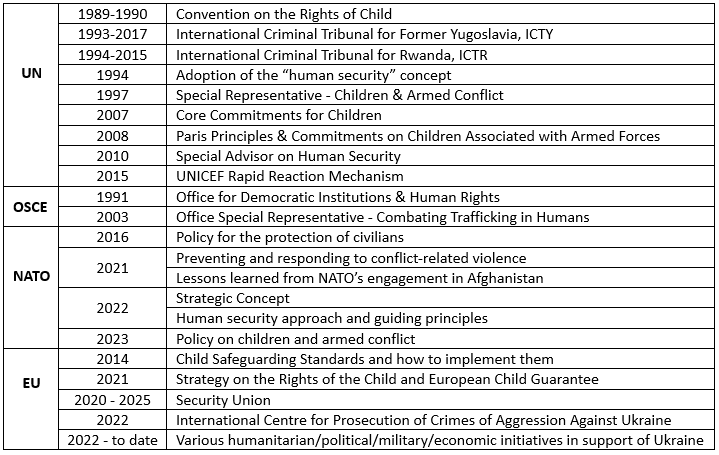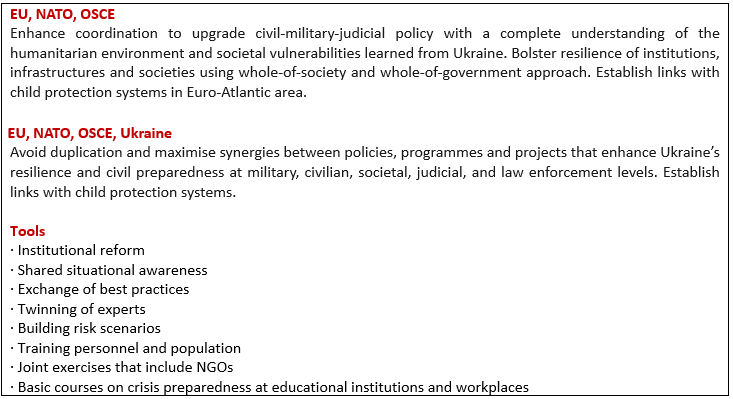Russia’s war in Ukraine has unleashed the greatest human security crisis in Europe since the death of Stalin in 1953 and the 1990s Yugoslav Wars. Despite global policies in place since the 1990s and rising evidence of war crimes in 2022-23, it has highlighted the international community’s failure to protect people. This emboldens Russia to defeat freedom, security, and human dignity in the Euro-Atlantic area and worldwide unless the EU, NATO, OSCE and UN act together.War is a politico-military enterprise with high costs to governments and societies alike. Indeed,
economies shift during a war to allocate resources to sustain military effort and violence for the purpose of security. Prices skyrocket, sending shockwaves to developed and less developed economies. Owing in part to Russia’s war in Ukraine, the global economy slowed in 2023, with only
a modest increase projected in 2024.
Military - Human security nexus
The threat and consequences of the war are far more complex than military and economic. They are ostensibly humanitarian. The connectivity between the military domain and human security is fundamental to understanding Russia’s aggression. This includes - but is far from limited to - the indiscriminate use of violence, child abductions, infrastructure attacks, weaponisation of food and forced migration of third-country nationals. They reaffirm Putin’s belief in total war, in the deliberate violation of international humanitarian law and the Geneva Conventions. Nothing is off limits, and everything is possible if it serves the Putinesque agenda.
Children of warThe number of forcibly deported Ukrainian children is high - it is estimated that
200,000 Ukrainian children have been deported to Russia, Russian-occupied territories in Ukraine, and
Belarus. These numbers are comparable to all children and youth that reside in the
Brussels capital region or to
280,000 Lithuanians, 70% of them women and children, deported to the Soviet Union in 1941 and 1945-1952. Back then, the international community was just emerging. Today, the contrast cannot be starker. Ukraine is a member of the UN, OSCE, an EU candidate country and NATO’s Enhanced Opportunities Partner. What message does the international community send to Russia if it does not honour commitments to its members and closest partners?
According to UNICEF,
4.3 million children or 57% of Ukraine’s child population, were displaced during the first month of the war. In November, Kyiv reported
511 child deaths, 1152 wounded, and 19,546 forcibly displaced or deported, with only 387 returned to Ukraine thus far. Since February 2022, NGO Magnolia in Ukraine received a
3152 or ten-fold increase in children missing compared to previous years.
Ukraine’s efforts at government and civil society levels are significant.
Bring Kids Back is President Zelenskyy’s strategic initiative spanning six areas of action. The NGO ‘
Save Ukraine’ undertakes rescue missions around the clock. Ukraine’s First Lady, Olena Zelenska, called several times for global action, including at
Davos 2023.
International responses - too few, too littleInternational organisations do not react adequately to the worsening situation in Ukraine.
While
the EU’s platform dedicated to beneficiaries of temporary protection is laudable, its application proved legally limited. For example, if a police officer receives a report about a missing Ukrainian child, the officer cannot access the platform. Additionally, some Member States do not register children with national protection services.
The EU recognises that. In fact, the number of missing Ukrainian children within the EU is unknown. There is no harmonised data sharing.
EU sanctions are insufficient, as is the proposal for
international conference on child abductions. Russians do not waste time at conferences.
Similarly, two arrest warrants issued since March 2023 by the UN-backed International Criminal Court for child abductions are too small.
NATO’s Policy on Children and Armed Conflict is welcome, but matters affecting children in war should be integrated in NATO-Ukraine strategic priorities and capacity building programmes.
Recently,
UN reported further evidence of Russian war crimes including, wilful killing, torture, rape, other sexual violence, and children deportations. In November, Kyiv documented
109,000 war crimes, a two-fold increase compared to
nine months ago. While war crimes are mounting, the international community is passively concerned despite key policies and legacies in place since the 1990s, summarised below.

To put this in perspective, Russia’s mobilisation for war is total. With
a 70% increase in defence spending for 2024, a
170,000 army boost, a new
AI strategy,
conscript raids, and
urging women to have eight children, Moscow is militarising to win Ukraine, which will further exacerbate human security. As Putin is preparing for more war, it is in the strategic national security interest of every international community member - from Brussels to Washington to Warsaw to Tokyo - to present a united front that out-thinks, out-supplies, and out-lasts Russia.
The solution is transnational: Everyone can play a roleThe protection of civilians in Ukraine and the wider Euro-Atlantic area is not an exclusively national matter. It is a shared security concern and international responsibility, which requires willpower, courage, and leadership. Here is an outline of recommendations for more integrated joint action across policy domains and stakeholders.
Recommendations
Accountability
 Human security
Human security

Resilience and civil preparedness in Euro-Atlantic area
Capacity building resilience and civil preparedness in Ukraine
 Transnational task force - Policy Symposium
Transnational task force - Policy Symposium

Influence
 Innovation
Innovation

Scaling up

Reserves
 No pasarán for Russia’s plans
No pasarán for Russia’s plansMany in the EU and wider Euro-Atlantic area take freedom and security for granted. One should not. Russia’s war of aggression is increasingly blurring the lines between the operational domain and the humanitarian environment and will stop at nothing. Based on lessons learned from Ukraine, the EU and international community can add value by embracing a collective action plan now. If it remains passively concerned while Russia is sharpening war blades, the Euro-Atlantic peace and security is doomed.
Maria Martisiute is a Policy Analyst at the European Policy Centre focusing on transnationalisation and strategic analysis.
This Commentary is part of the EPC's Ukraine's European Future project.
The support the European Policy Centre receives for its ongoing operations, or specifically for its publications, does not constitute an endorsement of their contents, which reflect the views of the authors only. Supporters and partners cannot be held responsible for any use that may be made of the information contained therein.
